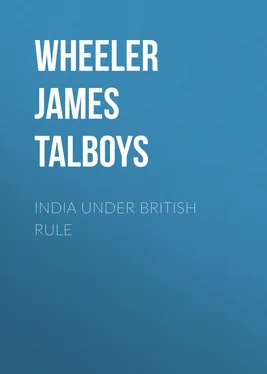James Talboys Wheeler
India Under British Rule / From the Foundation of the East India Company
A hundred years ago, when the lively Miss Frances Burney was weeping over the wrongs of Warren Hastings, and the learned and portly Gibbon was still lamenting that he had not entered on an Indian career, there were people in the British Isles who knew something of Indian history. They had picked up information respecting Indian affairs from the speeches of the grave Edmund Burke, the eloquent Charles James Fox, and the impassioned Richard Brinsley Sheridan. The facts may have come second hand, and been more or less distorted by the jealous and bitter fancies of Sir Philip Francis, the reputed author of the Letters of Junius ; but facts or fables, they served to enlighten the British public on the Indian questions of the day.
During the present century, the march of intellect has turned away from India, except as regards an outlet for cotton goods, a field for speculation in railways and teas, or a provision for younger sons in the "Indian civil." Within the last few years, however, there has been a change for the better. The British public has been alarmed at the fall in silver. It has been cheered by the proposal to place British-born subjects under the magisterial jurisdiction of Hindus and Mohammedans. It has been aroused by the prospect of a war with Russia in Central Asia; but it has been comforted by the restoration of the fortress of Gwalior to Maharaja Sindia. Moreover, Burma is no longer confounded with Bermuda, and no one groans over the annexation of the country, or the destruction of brigandage by the new rulers. Still there is room for more knowledge. The author, however, has before him a letter from an old friend in high position in India, who tells him plainly that the British government does not want history. Accordingly, the present work is not called a History of India , but India under British Rule .
More than one British ruler in India has, however, sinned against history, and might well like to shut it up with confidential minutes and secret negotiations. Within the present century, India has been desolated by wars as cruel as those of the Heptarchy, and as unmeaning as those of the White and Red Roses. Within the present generation, it has been distracted and tortured by a military revolt, created by a scare about greased cartridges, but leading to crimes more horrible than those of the French Revolution. Yet Anglo-Indian statesmen have been known to ignore the past, and to propound schemes for India that would be too advanced for any European nation excepting Great Britain. They have blinded themselves against history, like ostriches burying their faces in the sand. They have dealt with India, as the German philosopher dealt with the "camel," not by the facts before them, but out of the sublime depths of their moral consciousness, stirred up by a political caucus, or a philanthropic gathering in Exeter Hall.
Controversy and fault-finding are to be deprecated. But reform is only possible after a due consideration of what has been accomplished up to date by British rule in India, and of the flaws and faults in the existing constitution.
It will be seen from the first chapter, that the British traders of the seventeenth century, who established factories, built fortresses, and created manufacturing towns, also attempted to introduce representative and municipal government into the East India Company's once famous city of Madras. The second chapter reveals the fact that the acquisition of Bengal in the eighteenth century was not the work of ambition, but an act of self-preservation. The third chapter shows that the peace of India could not have been maintained in any possible way except by the establishment of British supremacy as the paramount power. The fourth chapter proves that the first Afghan war, needless as it turned out to be at the time, was the outcome of Russian ambition which dates back to the times of Peter the Great and Nadir Shah.
The story of the sepoy mutinies of 1857 occupies a considerable space in the present volume. It is not a mere narrative of military revolt, but a revelation of Asiatic nature; a lesson which every Anglo-Indian statesman must study, if he would avoid defeat or failure. The masses in the British Isles may read Biblical accounts of rebellion and massacre, or the story in Josephus of the atrocities of Herod the Great; but very few seem to realise the fact that they are reading Asiatic history, which has no reflex in Europe, nor in any country under European rule except British India. The horrible intrigues and murders in the household of Herod; his frantic passion for the fair Mariamne; the malicious lies of Salome; the assassination of Mariamne by her jealous and infuriated husband; the alternations in the mind of Herod as regards Cleopatra, whether to accept her love or murder her;—find no parallels in European history, excepting perhaps in Turkey, or in the Russian court of the last century.
The last chapter in the present volume is devoted to the constitutional changes in the government of India, and in the local governments, since the mutinies. The author has not indulged in the hope of raising Asiatics to the level of Europeans by the premature introduction of representative government. He considers that such a scheme would for the present be as much out of place in Asia as a republic of boys for the control of schoolmasters. British India is treated as a political school for Asiatics, in which Europeans are the teachers; and so long as that theory of government is upheld, constitutional reforms in India are practical and possible.
In conclusion, the author has to express his obligations to Professor Terrien de Lacouperie of the London University College, and to his own son, Owen E. Wheeler of the Leicestershire Regiment, for revising the proofs of the present work, and for many valuable suggestions.
Fulham,
12th May, 1886 .
PART I.—EAST INDIA COMPANY
CHAPTER I.—FIRST PERIOD: FACTORIES, FORTRESSES, TOWNS.—1600-1756
§1. India in 1600. §2. British at Surat and Masulipatam: Commercial and Social Life, 1612-1638. §3. Rise and Growth of Madras, 1639-1680: Portuguese and Dutch Neighbours. §4. British Rule and Representative Government, 1686. §5. Mixed Corporation of Europeans and Natives, 1688. §6. Slavery and the Slave Trade in India. §7. Madras, Surat, Bombay, and Hughly. §8. Collision with the Great Mogul, 1686-1700. §9. Domestic Administration, 1700-1746. §10. Wars against France in Southern India, 1746-1756. §11. The Black Hole at Calcutta, June, 1756.
Rise of British rule.
The rise of British rule in India is a problem in history. A single association of British traders established factories which grew into fortresses, and governed native towns which became the capitals of a British empire. The march of events is without a parallel in the annals of the world. In 1600 the East India Company obtained from Queen Elizabeth a charter of exclusive rights to trade in the Eastern seas. In 1612 it established its first factory at Surat. In 1639 it began to build a fortified factory at Madras, whilst a Hindu population of weavers and other manufacturers grew up by its side. Before the beginning of the eighteenth century, before Queen Anne ascended the throne of Great Britain, the British settlements at Madras, Bombay, and Calcutta had each a fortress and a town. How Hindu and Mohammedan populations were ruled by British traders will be told in the present chapter. How the British traders acquired provinces and established an empire belongs to the after chapters.
Northern India: the Great Mogul.
§1. In 1600 the whole of Northern India was under the dominion of a Mohammedan sovereign, known as the Great Mogul. His revenues and armies were the marvel of Europe. His empire extended from the mountains of Cashmere to the Bay of Bengal, from the slopes of the Himalayas to the tableland of the Deccan. It covered large Hindu populations and many Hindu principalities, for throughout this vast area the Great Mogul was sovereign lord of all, the emperor, the Padishah.
Читать дальше












